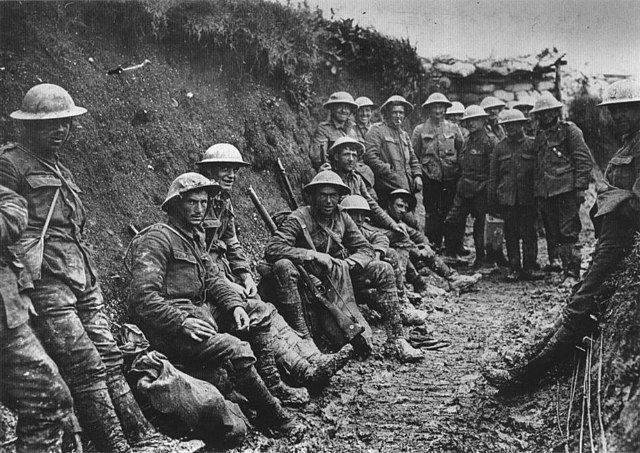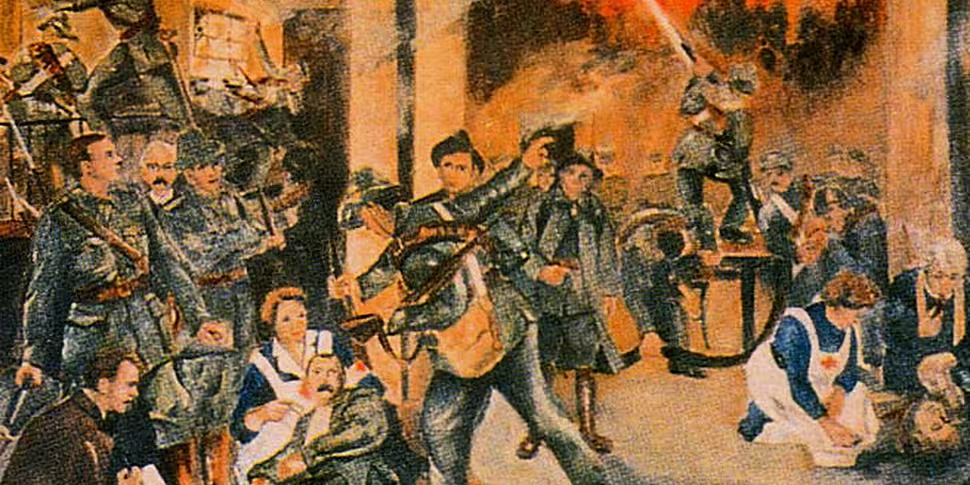All changed, changed utterly - ‘Easter 1916’ by W.B. Yeats
On April 24th 1916 Patrick Pearse read the Proclamation of the Irish Republic from the steps of the GPO as the Irish Volunteers and Citizen Army seized key buildings around Dublin. Poor turnout and planning saw the Rising end in defeat for Pearse and his cohorts. Yet British mismanagement fulfilled Pearse’s words from the dock, ‘We have kept faith with the past, and handed on its tradition to the future’, as momentum gathered behind the Irish independence movement. In 1922 the Irish Free State was formed and the process of mythologising the men and women of 1916 began.
These early occasions of remembrance were not free from the personal politics and petty grievances that lingered after the Civil War. Each anniversary was seemingly used for political one-upmanship as parties tried to claim the legacy of 1916 as their own; the failure to send invitations to the Opposition in 1966 proving a particular point of contention. The events marking the 50th anniversary of 1916, however, proved to be the high-water mark of Irish nationalist celebrations.
The outbreak of violence in Northern Ireland and a global shift away from nationalism saw the sacred orthodoxy of 1916 scrutinised by the emerging school of historical revisionism. Starting in the ‘60s this movement looked at all aspects of Irish history with a fresh perspective, treading on many toes as they questioned the popular narratives of important events like the Great Famine and 1798. The revolutionary period of the 1910s and ‘20s came under particular scrutiny as historians questioned the need for violence during a time of ongoing parliamentary reform.
 Irish Citizen Army group outside Liberty Hall, 1914
Irish Citizen Army group outside Liberty Hall, 1914
Though the arguments of the revisionist school faced strong opposition, the decades following the ‘60s saw a falling off of nationalist fervour. This was in part a reaction to the growing Troubles in Northern Ireland where the high cost of ideology was all too frequently on display. As 1991 and the 75th anniversary of the Rising approached the decision was made by the Irish state to mutedly let it pass. Fears that any commemoration might incite violence or worsen the Troubles outweighed any nationalist drive for remembrance.
Since the Good Friday Agreement, however, an uneasy peace has prevailed in Northern Ireland. Though this has been far from a perfect accord the stability and security afforded by the Agreement meant Ireland could be comfortable marking the anniversary of the Rising each year since 2006. With the worry of violence and sectarian backlash largely gone the path is clear to mark the centenary of 1916. Yet the planned commemorations, the details of which were released last year, have met with criticism from many corners.
Much of this controversy surrounding 1916 comes from the myriad of politically opposed events that are all clamouring for remembrance. While those in the centre try to argue that the Somme and the Rising can be commemorated equally there are many who think otherwise. Any celebration or commemoration of the revolutionaries who turned to violence and pragmatically allied themselves with the Central Powers could be galling for the people remembering the soldiers who fought in Europe and abroad. In the same way many who look to honour the men and women of 1916 will be irked by any national remembering of those who fought for the Empire which their heroes struggled against.
The complexity of remembrance surrounding 1916 and Ireland’s struggle for independence can be seen in the debates that occurred during the 100 year anniversary of the passage of the Home Rule Bill last year. Though once set to be a central milestone in Irish history, the passing of this Bill has been left largely unremembered outside of historical circles. This is due to the dichotomy between Home Rule and the Easter Rising, with the latter leaving the Bill an empty document as Ireland pushed for full independence after World War One. Celebration of one is inevitably seen as a criticism of the other.
 A ration party of the Royal Irish Rifles in a communication trench during the Battle of the Somme. The date is believed to be 1 July 1916, the first day on the Somme, and the unit is possibly the 1st Battalion, Royal Irish Rifles (25th Brigade, 8th Division).
A ration party of the Royal Irish Rifles in a communication trench during the Battle of the Somme. The date is believed to be 1 July 1916, the first day on the Somme, and the unit is possibly the 1st Battalion, Royal Irish Rifles (25th Brigade, 8th Division).
As we look to commemorate these events 100 years later the ideologies that clashed so long ago have risen once again. Should Irish nationalism and the myth of the nation be founded on the violent struggle of 1916 or should we instead embrace the compromising diplomacy of Home Rule? This Sunday ‘Talking History’ is hosting a special two hour discussion from the National Library on commemoration and Ireland’s relationship with the past.
Patrick talks with a panel of experts as we delve into the history of 1916 and debate the merits and faults of commemoration. We also look at those aspects of the Easter Rising that have seemingly been left behind. Though women were central in defining the revolutionary ideology of 1916 Irish nationalism and played a huge role in the Rising and later War of Independence their reward has been unfavourable. With institutional discrimination lasting well into the ‘70s and women making up only 16% of sitting TDs today, the highest in the history of the state, we look at the role of women in 1916 and how history remembered them.
'Talking History' looks at the role and purpose of commemoration. Why do we look so intently at the past? Does it do more harm than good? Do we still carry the legacy of colonialism and Empire? Or have the decades of diplomacy changed our relationship with our nearest neighbour? With the centenary only round the corner is it time that we left the republican nationalism of 1916 behind and revised our national myth? Or is this a part of our history that should always be remembered and commemorated?









